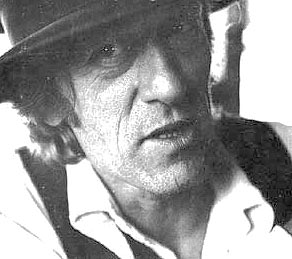from Jacket
The strengthy message here in #22 of 24 Love Songs can be summed up in two lines: ['There is/no sense to beauty. . .' and '. . .How/ the world is shit/ and I mean all of it] What I also like about this brief poem is the interplay between the title of the book and the subject of the poems (love/anti-love (which is not hate)): it's all a mass of contradictions, like love. And I have to say that the shorter poems of the Love Songs and the last book he wrote before dying (Chemo Sábe) seem to me much better and more memorable than the Slinger/Gunslinger poems. These (generally) later poems probably attempt less stylistically, but are more sure-handed, hacked from a soap bar, maybe. Easy to use, but disappear after use. In any case, Dorn is well worth the reading and re-reading, for me, though he'll never become one of my favorites. And doesn't every poet want that, dead or alive? ;-)
#22
The agony is beauty
that you can't have that
and sense too. There is
no sense to beauty. It offends
everyone, the more so
in ratio to the praise of it.
And I've known this for a long
time, there has been no
great necessity to say. How
the world is shit
and I mean all of it
Other people thinking about Dorn:
Joe Safdie, from Jacket, "Ed Dorn and the Politics of Love".
Electronic Poetry Center's Dorn collection
Critical Obsolescence: Ed Dorn Live
Kyle Waugh, from Jacket again, "You Are Sometimes in the Trance of What Is Beyond You": Upheaval, Incantation and Ed Dorn in the Summer of 1968


Agree about Dorn--he is very fine at times, as in Gran Apacheria, his masterpiece. What is built up to slowly and transparently, for example, in this passage, which I have set to images:
ReplyDeletehttp://goodsoldiersandcloselywatchedtrains.blogspot.com/2009/02/so-infant-is-bound.html
Near the end of his life Dorn was talking about the death of poetry, which was perhaps the death of poetry for him, but also for him as an American.
It is not true, of course--Neruda opened a new door in Spanish and for a new ear.
EAC
Well what is a masterpiece? Dorn grew up in rural poverty during the Great Depression. A long way from these pampered and woke times. He'll be forgotten for awhile, but he'll be back. His was a vision of love, justice, equality, of transcending the greed, money, power, empire, & status quo of "the white world" mid-20th century. It's everywhere in his writing, the anger, never accepting the waste heap of injustice that surrounded him, America's dark side. Many of the poems from the 60s, The Newly Fallen, Hands Up, Geography, The North Atlantic Turbine, are like nothing else produced in American poetry. Dorn's ear and sense of tone are flawless. A 20th century master.
ReplyDeleteThanks for the reminder, I dig his later work.
ReplyDelete